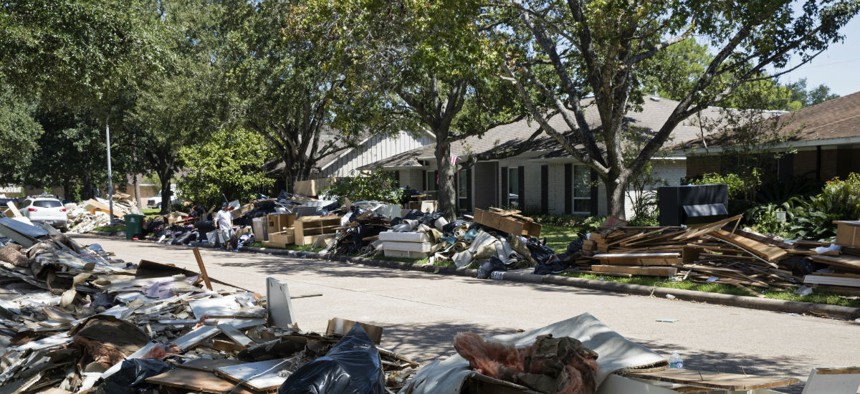FEMA Showed Weak Mastery of Contracts During Hurricane Response and Recovery
GAO report on $5 billion spent after Harvey, Irma and Maria shows "inconsistencies" in contracting.
Four agencies providing disaster relief following the triple hurricanes and California wildfires of 2017 failed to keep proper records of contracts with suppliers, rendering it impractical for the Government Accountability Office to fully track $5 billion in spending.
GAO’s report released on Wednesday examined 23 sample contracts let after the disasters by the Federal Emergency Management Agency, the Army Corps of Engineers, the Coast Guard and the Defense Logistics Agency. Its conclusion: the full extent of contracting related to the 2017 disasters is unknown due to Homeland Security Department’s irregular schedule for closing contracts and inconsistent use of standard contracting codes.
Disaster relief contracts for everything from ready-made meals to tarpaulins can be awarded prospectively—before anyone knows the date of a coming act of God—or after the storm or fire has rendered thousands homeless or living in damaged property.
But among the contracts studied as of June 30, 2018—following a record-setting displacement of 15 percent of the U.S. population from several natural events—GAO reviewed the three-fourths of the obligations that were let by FEMA and the Army engineers and found that the Homeland Security Department violated procedure with early closures of what are called national interest action codes. Those numbered codes, administered by the General Services Administration, allow agencies to track data on contract actions related to national emergencies, and are available on the Federal Procurement Data System-Next Generation to provide governmentwide insight into response and recovery efforts.
But instead of keeping the codes active for five years, as occurred after the 2005 Hurricane Katrina, the two agencies cut them off after one year.
Contracting officers at the agencies also appeared unaware of the law’s requirement that federal agencies give preference to local businesses in disaster areas for the contracts used to clean up and rebuild, to help jump-start area economies.
Other problems arose due to imprecise contract requirements, GAO found. “After Hurricane Harvey, FEMA awarded contracts to supply a food bank,” the report said. “Officials told us the initial requirement from the food bank through the program office to the contracting officer was expressed in terms of 'truck loads' but did not specify, for example, how large the truck should be, or how many pallets should be loaded per truck.”
FEMA at first awarded two contracts, one for short-term, one for a longer term. “However, due to miscommunication of the requirement as documented in the contract files and according to a program official responsible for the contracts, FEMA needed to award a third contract for an additional 2.5 months and $23 million to meet the need,” the report said. “Due to the value of the contracts, FEMA deemed that the subsequent contract required a new solicitation and award, rather than a modification to the existing contracts, thereby increasing the time and effort required of procurement personnel to meet the post-disaster need for food.”
In another instance, in response to Hurricane Maria’s devastation of Puerto Rico, FEMA awarded four post-disaster contracts for self-help tarps, used to cover small areas of roof damage. “Of these contracts, two were terminated for convenience,” GAO said, due in part to a national supply shortage. “FEMA officials told us that under one of the contracts included in our review, at the request of the Commonwealth of Puerto Rico through program officials, FEMA ordered 500,000 40-foot-by-40-foot tarps, which differ from the size of the tarps normally ordered and stocked by the agency. Due to the supply shortage, FEMA received none, but officials noted that the impact of not receiving the tarps was minimal because the agency had initially overestimated the total number of tarps needed.”
GAO made 10 recommendations, including that DHS reopen national interest action codes for Hurricanes Harvey and Irma; that the Army Corps provide guidance on the definition of a local area; and the Coast Guard and Army Corps provide guidance to ensure contracting requirements for the use of non-local vendors are met.
Agencies concurred with nine of the recommendations.
DHS did not agree that the national interest action codes should be reopened, saying that would violate the department’s ongoing memoranda of understanding on the codes with the Defense Department and GSA.




